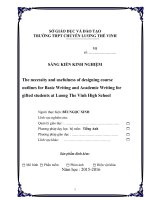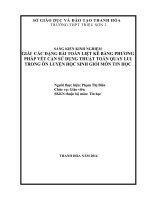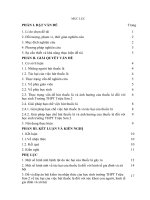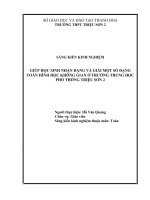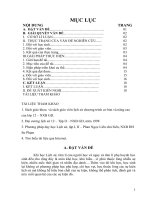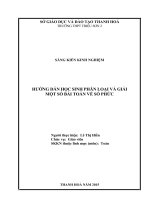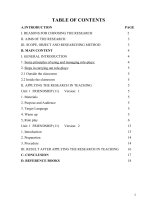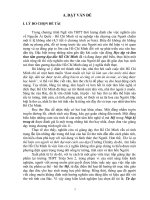SKKN sáng kiến kinh ngiệm studentmotivation in writing for 11th grade at trieu son no2 high school
Bạn đang xem bản rút gọn của tài liệu. Xem và tải ngay bản đầy đủ của tài liệu tại đây (513.2 KB, 23 trang )
PART 1:
INTRODUCTION
I. RATIONALE
Nowadays English has become an international language because it is widely
used in many parts of the world. In the tendency of integration of the global
economy, English is one of the effective communicative tools for everybody.
The role of English is considered to be very important in the fields of
economics, politics, science, culture and education. Especially, Vietnam’s
official membership of WTO on 7th November 2006 opened a new door for
integrating into the world economy, and more and more people want to learn
English for communicating with foreign partners, tourism, study tours, etc.
Thanks to the innovation of ways in teaching English, English lessons are taught
with four skills (speaking, reading, listening, writing) in one unit. Moreover,
there exists three stages – Pre - while – post - teaching in one lesson. This really
helps students improve their skills beside the grammar exercises to pass the
exams.
When teaching writing skill to the 11th students at TRIEU SON N02 High
School , I found out that pre – writing stages are very important in teaching
writing and it also has significant effects on the students’ writing performance.
If students do not prepare well enough they can not write well, they can not even
write anything in their notebooks.
To these seasons I decided to carry out the action research on “ students’
motivation in writing for 11th graders at TRIEU SON NO2 high school’’
Because the writing activities are important to teachers of English at TRIEU
SON N02 High School. Based on the results of this action research, some
changes and improvements could be applied in my lessons, and some
appropriate strategies needed to be designed with the hope that students will
work more effectively in a writing lesson. Hopefully that the results of this study
would be shared with any colleagues who had the same problem or anyone who
is interested in this study.
1
PART 2: PROBLEM SOLVING
CHAPTER 1: METHODOLOGY
I. Research setting
I.1. An overview of TRIEU SON High School No2
Triệu Sơn High School No2 is located in the West of Thanh Hoa. Founded in
1968, Triệu Sơn High School No2 is one of the oldest as well as the biggest
schools in the area. At present, there are 21 classes with over 900 students
placed into three different grades: grade 10, 11 and 12. The teaching staff
composes of more than 60 teachers of 12 compulsory subjects, of whom twothirds are young, creative and well trained whereas the others are experienced
and enthusiastic. In recent years Triệu Sơn High School No2 is one of the
schools which has high percentages of high school graduate and gifted students.
I.2. The teachers of English in Triệu Sơn High School No2
There are six teachers of English currently working at Triệu Sơn High
School No2, four of them have participated in this research for discussion. Their
ages range from late twenties to forty years old, three of them are female. The
years of teaching English are also different, minimum level of eight years and
maximum nearly fifteen years. Most of them have University Bachelor’s
Degree, one Master Degree, and the others have taken the in-service training
courses. Without doubt, all the teachers at Triệu Sơn High School No2 are
experienced and enthusiastic in teaching. They are willing to help their students
overcome their difficulties in learning English generally and in speaking
particularly.
I.3. The students in Triệu Sơn High School No2
The majority of students in the study at Triệu Sơn High School No2 are
aged from 15 to 18. Most of them come from rural areas and they have learnt
English since lower secondary schools. Among them, there are a large number
of students who are really interested in learning English and want to develop
their ability in using English. In contrast, the other part of students is low in
motivation. They tend to regard English as less important than other subjects
and they study English only in order to pass the examinations.
2
I.4. The situation of English teaching and learning English in Triệu Sơn
High School No2
The syllabus of teaching and learning English.
At Triệu Sơn High School No2, English is one of the compulsory subjects
in the curriculum. The syllabus and the textbooks for English including “Tiếng
Anh 10”, “Tiếng Anh 11”, “Tiếng Anh 12” are prescribed by the Ministry of
Education and Training.
The English curriculum for grade 10th students is divided into two semesters
with a total of 105 periods, 3 periods per week. Each period is 45 minutes long.
The textbook which is currently used for teaching and learning English for grade
10th at Triệu Sơn High School No2 is “Tieng Anh 10” which was designed
following communicative approach. The textbook consists of 16 units with 5
parts in each unit arranging as follows: reading, speaking, listening, writing and
language focus in which a variety of exercises and tasks was compiled for
practice. Also, there exists a consolidate unit after every 3 units. The objective
of these units is to examine how well the students have achieved in the previous
units.
II.THE WRITING PROGRAM FOR GRADE 11TH STUDENTS AT
TRIEU SON N02 HIGH SCHOOL
II.1.The objectives of the program
Basing on the new textbooks designed by the Ministry of Education and
Training, English are taught with four skills and Language Focus which focuses
on grammar and pronunciation. The writing program at TRIEU SON N02 high
school follow the syllabus of the MOET ( Ministry of Education and Training)
with the aim of improving students’ abilities in writing. On English 11 textbook,
there are a range of types to practice writing with narrative, writing letters,
describing statistics from a chart or a table or writing a report or a biography.
As regards the language, for students sometimes have to depend on the
provided structures and phrases or vocabularies. However, some of them start to
be aware of and perform different styles as well as various levels of formality to
match the writing situation. But most of their works still need to be examined
for vocabulary and style accuracy.
3
In terms of methodology, students are expected to master the general
study skills. Students should be active in self – studying, peer and group
cooperation. They understand the process in teaching and learning writing and
know how to write.
II. 2. The teaching materials
The course books used to teach writing skills to the grade 11 th students of
Trieu son No2 High School is English 11 by MOET
CHAPTER TWO: ACTION RESEARCH PROCEDURE
I. PRE – IMPROVEMENT STAGE
STEP 1: IDENTIFYING THE PROBLEM
I.1. Identifying the problem
The action research was carried out with the aim of finding “The effects
of writing activities on grade 11th students’ writing performance at TRIEU SON
N02 High School” While teaching writing at this school, I realizes that some
English teachers, for some reasons, do not usually conduct the writing activities
effectively at writing lessons. To make it clearly how writing activities affect to
the students’ writing performance, some factors related to students’ participation
in writing stage will be discussed in this part
I.2. Observing a lesson that illustrated the problem
Three volunteer teachers from other classes were asked to come to classes
11C6 and 11C7 in two different periods to observe the writing lesson without
notifying to the teacher and all the students in that class. The observers just
focused on what the teacher did in writing stage and the reaction of students in
the class at this stage. What is more, the teachers collected some of students’
writing papers in order to compare the differences in students’ writing
performance between the pre and post improvement stage of this research.
A. BRIEF DESCRIPTION OF THE LESSON
1. Topic for the writing task
“Writing a formal letter expressing gratitude”
2. Time allowance: 10 minutes (3 minutes for warm – up and 7 minutes for pre
– writing activities)
4
B. THE RESULTS OF PRE – IMPROVEMENT CLASS OBSERVATION
Class
Teachers’ activities
11C6
For warm – up:
Teacher pointed at the
textbook and asked her
students “What is this?” –
“OK. Today we are going to
learn how to write a formal
letter
of
expressing
gratitude”
For pre – writing stage:
Teacher asked her students to
do Task 1, and then she
explained some new words
such as donated, gratitude ,
receipt
Teacher asked students to do
Task 2 for the while –
writing stage
11C7
Students’
activities
Some of them
said “It is a
letter”.
Some
said
nothing,
some kept on
personal talks
The class was
noisy because of
the hot weather.
Most of the
students
did
nothing
and
only some of
them listened to
what the teacher
said
For warm – up:
Teacher showed a letter “Yes”
copied in A4 paper and asked
the students “Can you see
what do you call this? Is this
a letter?”
Students
For pre – writing stage:
Teacher also asked students seemed
tired
to do task 1 in the textbook and nervous and
and then she answered all the tried to finish
questions by herself if there their task
was no reply from the
Comments
This is a typical
lesson of a careless
teacher. She did
not
prepare
anything for the
lesson so students
felt bored with her
lesson so that their
writing
performance would
be affected
This is a teacher –
centered teaching
approach.
The
teacher did not
notice the feelings
of the students.
Teacher even gave
a wrong sentence
“Can you see what
do you call this?”
at warm – up
stage. This shows
5
that teacher didn’t
prepare the lesson
plan
before
teaching
that
writing lesson.
students
Teacher also asked students
to do task 2 with no emphasis
on what they had to do to
write a letter of expressing
gratitude
The above results show that the problem of ineffective pre – writing activities
was true in writing lessons in classes of TRIEU SON N02 High School. The
next step is to conduct a survey to find out the causes of the problem from
students
I.3. Conducting a survey to get information from students
80 students were asked to give their answers to the 5 questions and then handed
in their papers to the teacher. These were the results of the survey:
Question 1: What is your self - assessment on your writing performance
today?
Very bad
Bad
Fair
Good
Very Good
No
%
No
%
No
%
No
%
No
%
35
43.75
20
25
8
10
12
15
5
6.25
The data in Table 1 shows that the writing performance of the grade 11 students
at TRIEU SON N02 High School was not good. The percentage of the students
who thought their writing performance on that day were very bad was 43.75%
and bad was 25%. What is more, 10% of the asked students assessed that they
had no idea of their writing performance. Meanwhile, the percentage of the
students thinking their writing performance were good and very good was 15%
and 6.25% respectively. Clearly, the findings show us that most of the students
feel their writing performance will be monotonous if there is nothing improved.
Question 2: Why aren’t you interested in taking part in the pre – writing
activities today?
6
Reasons
No
%
My vocabulary and grammar structures are so
poor
55
87.3%
I don’t know much about the writing topic
40
63.5%
The topic is not a “hot” one
32
50.79%
I don’t feel being motivated enough
26
41.26%
Others (the classroom is not comfortable
enough with the dim lights, the picture is so
small to see, the fans spin slowly)
12
19.04%
As can be seen from the table, a large majority of the students (87.3%) stated
that their vocabulary and grammar structures were not enough to take part in the
pre – writing activities on that day. 63.5% of them said that they did not know
much about the topic. One more reason for the inactiveness of students in that
pre – writing activity is that students thought that the topic was not “hot”
enough. This accounted for 50.79% of the students. Motivation and other
classroom effects added 41.26% and 19.04% respectively to the list. From the
information collected, teachers at TRIEU SON N02 High School should be
aware of some factors affecting to the students’ participation in pre – writing
stage so that they can conduct more effective activities that help students write
better.
Question 5:
Multiple choices:
a. Teacher doesn’t conduct the pre – writing activity effectively
b. It is hard to hear what the teacher talks in the activity
c. The topic is not enlightened well enough
d. The teacher’s instructions are not clear enough (You feel confused with
what to do)
e. Others: Teacher’s bad mood, she doesn’t make up…
7
Question
Choice
Notes
Besides
the a
b
c
d
e
above reasons, 58
22
15
42
10
which of the (92.6%) (34.9%) (23.81%) (67.7%) (15.87%)
following
teachers
–
related
–
problems
making you feel
not
motivated
enough
in
today’s pre –
writing activity ?
As can be seen from the table, almost all the students agreed that on that day,
their teacher conducted a boring pre – writing activity whereas 67.7% of them
reckoned that their teacher gave unclear instructions and 34.9% of them thought
that it’s hard to hear what the teacher talked in the pre – writing activity. This
proves that teacher’s carelessness in preparing activities in pre – writing stage is
the main reason that causes the students’ inactiveness in the stage. In addition,
smaller percentage of other teachers – related factor such as the teachers’ mood
or appearance or the ineffective topic exploitation are also counted for students’
low motivation in taking part in this stage.
STEP 2: FINDING CAUSES OF THE PROBLEM
I.4. Consulting with colleagues
In order to get more professional advice, suggestions and ideas about the
problem of finding out “the effects of writing activities to students’ writing
performance” and with the aims of making teachers at TRIEU SON N02 High
School realized the importance writing activities in teaching writing the author
of the research consulted with 15 English teachers who are teaching in the
English Division at High School.
8
The following questions were chosen for teachers of English in the English
Division at TRIEU SON N02 High School to answer on piece of paper:
Question 1. According to you, how important these activities affect to
students’ writing performance?
Item No
(1) Least important → Most important (5)
1(%)
2(%)
3(%)
4(%)
5(%)
a
0
6.6
26.6
33.3
33.5
b
6.6
13.3
6.8
53.3
20
c
0
40
20
26.7
13.3
d
16.6
33.3
41.6
2.5
6
a. Warm – up activities.
b.Pre – writing activities
c. While – writing activities.
d. After – writing activities.
Table 6 summarizes the teachers’ ideas about the importance of pre – writing
activities on students’ writing performance. In general, they thought that pre –
writing activities affect most students’ writing performance. Coming back to the
above analysis, we also can see that warm – up activities ranked the second
after pre – writing activities in the teachers’ view toward its relationship with
students’ writing performance meanwhile while and after – writing stage were
appreciated less important than the above activities
Clearly, the findings show that English teachers at TRIEU SON N02 High
School realized that pre – writing activities are really important to measure their
students’ writing performance.
Question 2. What is your suggestion toward the ineffective pre – writing
activities?
12 teachers who wished to change the situation gave the following suggestions.
They are rearranged already.
1. Teachers should prepare well enough for both English proficiency and
suitable activities.
2. Teachers should make sure that the students understand what she/he said.
9
3. Teachers should take notice to their students – related problems such as
students’ low motivation, their English ability and also the writing topic for
them.
4. Besides, teachers should also take care of the classroom restraints when
conducting the activities.
5. Last but not least, the time limitation in this stage is another difficulty
therefore teachers should take care of this by choosing the suitable activities for
this stage.
II. TRY – OUT STAGE
STEP 3: DESIGNING STRATEGIES FOR IMPROVEMENT
From the comments, ideas and suggestions from the students, colleagues,
professional books or journals and my own teaching experience I designed the
following strategies to improve the problem:
1. Preparing more than ONE suitable activities for pre – writing stage and
making the writing topic easier.
2. Trying to avoid the unclear instructions and English proficiency problems
3. Making sure that students are motivated to work and be more interested in
the writing lessons.
4. Trying to avoid the classroom restraints.
5. Paying more attention to less – active or quiet students and encouraging
them to work.
6. Managing time well in each part of the writing lesson.
STEP 4: TRYING OUT STRATEGIES AND MAKING NOTES ON WHAT
HAPPENED IN THE CLASS.
The new strategies and changes were tried out in the next practice writing
lesson. All the changes and improvements or even new or bad problems after
each lesson were made notes by the teacher in brief.
* The first try – out lesson – at class 11C6:
Topic: “Describing information in a table”
- Pre – writing activities lasted for 10 minutes.
- Teacher prepared a table drawn in A0 paper, the classroom was comfortable
and well – prepared.
- After the warm – up activities, the teacher presented the words and the
language expressions used in describing a table with some symbols of “rise”,
10
“drop”, “slightly”, “Sharply”….All these symbols were drawn on the board.
Teacher checked the words by showing at the symbols and the students read the
words without looking at the letters or the translation of the teacher. At the end
of the stage, teacher divided the class into 3 big teams and let students play a
game in which the longer sentences were emphasized such as “the number of
the literate females dropped sharply in 2006”, “it increased slightly”…If
any team has more correct sentences, they will be the winners.
- It might be a successful lesson.
* The second try – out lesson – at class 11C7:
Topic: Topic: “Describing information in a table”
- Pre – writing activities lasted in 10 minutes in a comfortable classroom.
- After the exciting warm up activities of a game “Word category” with the aim
of presenting the new words in describing a table, the teacher showed a A0
paper with the number indicating the trends of falling, increasing….The
students might be successful in writing this kind of exercise because there were
a large number of students repeated these expressions.
III. POST – IMPROVEMENT STAGE
STEP 5: EVALUATING THE TRY – OUT
- Three volunteer teachers were asked to observe a lesson after the trying – out
stage that illustrated the changes that had been made.
- The results of class observation was used to reflect on the reasons for those
changes (which could include things that were improved or that got worse).
- A survey was carried out to get information from students.
- Comments and conclusions were made.
III.1. Post – improvement class observation
A. BRIEF DESCRIPTION OF THE LESSON
1. Topic for writing essay:
“Write about one of the competitions for secondary school students on TV”
2. Time allowance: 10 minutes
3. Classroom observation description
Time/
Activity
Teachers’ activities
Students’
activities
1. Warm – up Teacher asked some “Yes”
Comments
This
period
is
11
(5’)
2.
Pre
writing
activity
(10’)
questions such as “Do
you often watch game
shows on TV?” “Can
you tell me the names
of these competitions
for secondary school
students on TV?” .
- Teacher showed
some big pictures of
the famous game show
“Road to Olympia”
and asked students to
play the game “What
is this?”. There are
five big pictures, all
are copied from the
gameshow on TV. If
any team can guess
– the name of the game
at the first picture will
get the highest mark.
The marks will be
counted backward.
Teacher
asked
students to answer the
six suggestions about
the content of the
game show in the
textbook. All the
students of the class
had the chance to talk
- Road to
Olympia
- Tuoi Doi
Menh
Mong
- Nguoi
ban gai
dang
men
- Rung
chuong
vang
After looking at
those pictures,
students
discovered the
name of the
game show was
“Road
to
Olympia” at the
second picture
and the winner
is group 1 in
the class. The
class is excited
with a big
applause for the
winner.
considered to be
successful. After
being consulted
by
English
teachers
at
TRIEU SON N02
High School as
well
as
conducting
the
two try – out
lessons, teacher
has
withdrawn
some reasons for
the success of the
period
1. Pre – activity is
interesting
2. Visual aids are
effective enough
3.
Students
cooperate better
because they are
acquaintances
4. New words and
structures
are
taught logically
5. There is no
problem
with
students’
misunderstanding
toward teachers’
instructions.
12
3. While
writing
activity
(20’)
about the show before
writing it.
– - Students can discuss
in groups and choose
one competition to
write about
Teacher
asked
students to make
sentences basing on
the suggestions in the
textbook and practice
in pairs.
- Teacher asked the
students to write about
any competitions for
secondary
school
students on TV. Most
of them chose the
show
“Road
to
Olympia” and some
chose other show such
as “Not Nhac Vui” or
“Tuoi
Doi
Menh
Mong” – the singing
contest and even one
of
them
chose
“Ringing The Golden
Bell” – a famous game
show for students at
university.
T: “What time
is it on TV?”
S:
“Ten
o’clock”
“What chanel is
it on?”
“ VTV3”
S: How long
does it last?
S: 2 hours
S: How many
parts are there
in the show?
S: four parts
S: How many
competitors are
there?
S: four
................
- Students write
the passage in a
very
good
mood with the
content
suggested
in
the textbook.
Some of them
write
short
passage.
However, some
write very well
13
– done ones
4. Post
writing
activity
(12’)
– - Ask students to work - Students do
in pairs for peer the
peer
correction.
correction
- Teacher goes around
to check whether
students can correct
their
classmates’
writing. If students
need her help, the
teacher will help them
to correct the mistakes
5.Homewo - Read your passage - Write on the
again, make it perfect notebook
rk
and retell it in the next
(3’)
period.
Bellows are some more comments about the improvement of the students in post
– improvement stage:
Pre – improvement
Students’
Low
30% of the students did motivation
not write because they
said that the topic was
boring. Some of them
were forced to write
basing
on
the
suggestions in Task 1.
They wrote in a bad
form of letter (See
Appendix…).
More
Post –improvement
Changes
Ss’
Higher
Most of students were eager to write
after the game because they said that
they liked the game so much
Less
14
Some students tried to
follow the suggestions
in Task 1 in the
textbook but theirs were
full
of
grammar
mistakes
and words
usages
(See
Appendix…)
mistakes
on
both
grammar
and
expressions
Mistakes
on
grammar
and
expressions has improved a lot.
There still existed some but for the
whole passage they were acceptable
because both the teacher and her
students need more time to perfect
these mistakes
Ss’
creativity
when
producing
a
new
writing
version
More creative
Ss’ creativity in writing is another
hard work to attain and Ss will make
their writing creative when they are
motivated enough or they feel much
interested in the writing topic. In the
post – improvement the students’
writing performance has been
improved
much.
b(See
the
appendix…)
Notes: This may take
longer time to improve
the situation but the
teacher should pay
much attention to this
because it is the goal in
teaching a productive
skill
Less creative
Some students in the
class did not know what
to do with their writings
so they copy the whole
sample letter in the text
book
ignoring
the
requirements of the
writing tasks
III.2. Post – improvement questionnaire for students
Question 1:
What do you think of your writing performance today?
a. Extremely unsatisfied
c. Satisfied
b. Unsatisfied
d. Good
e. Very good
15
Question
Choice
a
What do you think of 0%
your
writing
performance today?
Notes
b
c
d
e
0%
18.75% 43.75% 37.5%
It appears that students preferred the post – improvement lesson compared with
the pre – improvement one. The number of students who enjoyed the lesson and
felt confident with their writing performance accounted for 43.75% and 37.5%
respectively while there was no students stated that their writing performance is
very bad or bad (0%). The students’ writing performance improvement should
be assessed by the teacher but students’ ideas toward what they have done is an
important matter that we teacher should take into consideration.
Question 3:
Which of the changes made by the teacher were successful?
a. The teacher carried out interesting activities that made the class work well.
b. The teacher provided sufficient and effective new words and sentence
structures.
c. The teacher encouraged the less active students to work and give helps when
necessary.
d. The teacher gave clear instructions.
e. All of the above changes.
Question
Choice
a
Which of the changes 0%
made by the teacher
were successful?
Notes
b
c
d
e
0%
0%
0%
100%
All of the students (100%) agreed that the changes made by the teacher were
successful
16
PART 3: CONCLUSION
I. Summary of the main findings
As evidenced from the previous chapters, teachers in TRIEU SON N02
High School stated that they ever conducted pre – writing activities but it seems
that it didn’t work perfectly. What these writing classes really lack is more
effective pre – writing activities prepared by the teacher.
It has also been revealed from the data analysis that most teachers agreed that
they ever met many difficulties when they conducted pre – writing activities and
most of them chose the way of changing their method or activities with the hope
that the students would be more interested in the writing lessons. Teachers also
gave out some solutions to create more effective activities for pre – writing
stage. They emphasized that we, teachers, should be aware of some factors that
may affect the teaching writing process. These were classified into teacher –
related problems, student – related problems and some external ones such as
classroom restraints, time limitation
Another important finding is that in post – improvement stage most of the
students realized the changes from the teachers that made them write better.
They also felt more confident when writing. This was shown in their writing
performance in post – improvement stage.
II. Implications for more effective writing lessons
II.1. To the teachers
Choosing techniques is the day – to – day business of every writing
teacher. Pre – writing activities play a very important role in writing lessons
because if the teacher conducts this stage successfully, the classroom
atmosphere will change and also the students’ writing performance will be much
better. Therefore, the teacher should make sure that the following things are
done perfectly.
First of all, preparation is necessary for English teacher in writing lessons with a
list in details of activities prepared with useful language knowledge, good time
management for each activity, effective visual aids usages and clear instructions
giving. What is more, sometimes the writing topics in the textbook are boring,
the teacher should try to make them easier to attract students’ attention. One
17
more thing is that the teacher should know how to motivate the students by
changing the activities day by day or take care of the quiet students in the class.
II.2. To the classroom facilities
In Vietnam, it is normal that there are 40 to 50 students in a language
classroom at high school. This makes the teachers meet many difficulties in
conducting a language lesson. However, the situation can not be changed in a
short period of time so the teacher should get over all these difficulties by
making sure that the classroom facilities are comfortable enough before the
lessons start
III. Limitations and suggestions for further research
The study still has some limitations. First of all, this study is very small –
scale, which focuses on only the effects of pre – writing activities on the
students’ writing performance so while – writing activities roles are not
mentioned here. Secondly, the study basically bases on one source of data,
questionnaires, which might be subjective on the side of the informants, so the
researcher can not guarantee the reliability of the information collected. What is
more, the area of the study is only restricted to classroom writing in the textbook
published by MOET; thus, any application outside classroom context requires
careful thoughts and consideration. Finally, there were still some problems that
this study could not solve absolutely for during the try – out stage: The student’s
poor vocabularies and the insufficiency of grammar knowledge. This needs time
to realize the improvement. However, the teacher should pay much attention to
this goal when teaching a productive skill like writing. Hopefully that the above
problems could be solved in other studies after this research in the near future.
IV. Conclusion
This study is carried out as a contribution to the knowledge of all teachers
and students of English in their teaching and learning.
In previous chapters, the review of literature with theoretical backgrounds of
action research, teaching writing, factors affecting the students’ writing
performance are put at the beginning, the next are the study with the data
analysis and findings of questionnaires in pre – improvement stage, the trying –
out and the post – improvement stage. The last chapter gives recommendations
to the teachers and classroom facilities.
18
The author of this research does hope that this study would be of some value to
both teachers and students in their language teaching and learning process.
XÁC NHẬN CỦA THỦ TRƢỞNG
Thanh Hóa, ngày 25 tháng 5 năm 2015
ĐƠN VỊ
CAM KẾT KHÔNG COPY
Vũ Văn Quảng
19
THANH HOA MINISTRY OF EDUCATION AND TRAINING
TRIEU SON N02 UPPER- SECONDARY SCHOOL
EXPERIENCE INITIATIVES
STUDENTS’ MOTIVATION IN WRITING FOR 11TH
GRADE AT TRIEU SON N02 HIGH SCHOOL
RESEARCHER: Vu Van Quang
POSITION: TEACHER
FOREIG LANGUAGE GROUP
THANH HOA, MAY 2015
20
REFERENCES
1. Breach,D.(2005). Exploring the Vietnamese Concept of a “Good Teacher”.
Teacher’s Edition 16:30 – 37
2. Byrne, D. (1988). Teaching Writing Skills. Longman
3. Corey, S.M. (1953). Action Research to Improve School Practices. New
York: Teacher College Press
4. Downs,M.(2000). Increasing student Motivation. Teachers’ Edition 4: 8 – 13
5. Harmer,J.(2001). The Practice of English Language Teaching (3rd ed). Essex:
Longman
6.Leki,I.(1976).Academic Writing, Techniques and Tasks: ST.Martin Press, New
York.
7. Raimes,A. (1993). Teachniques in Teaching Writing. OUP.
8. Richards,J.C and Platt, J.,H.(1992).Longman Dictionary of Language
Teaching and Applied Linguistics. Longman.
9. Smith,W(1989).The Act of Writing. Random House, New York
21
TABLE OF CONTENTS
……………………………………………………………
Page
PART 1: INTRODUCTION
I. Rationale…………………………………………………………………......1
PART 2: PROBLEM SOLVING
CHAPTER 1: RESEARCH METHODOLOGY
I. Research setting …………………………………………………….……….2
I.1. An overview of Trieu Sơn No2 High School…………………………….2
I.2. The teachers of English in Trieu Sơn No2 High School ………….......…..2
I.3. The students in Trieu Sơn No2 High School................................................2
I.4. The situation of English teaching and learning English in Trieu Sơn High
School No2.........................................................................................................3
II. THE WRITING PROGRAM FOR GRADE 11TH STUDENTS AT TRIEU
SON N02 HIGH SCHOOL .......................................................................... ......3
II. 1. The objectives of the program................................................... ......3
II. 2. The teaching materials .............................................................. ......3
CHAPTER 2 ACTION RESEARCH PROCEDURE
I. Pre – Improvement stage .......................................................................... .......4
Step 1: Identifying the problem.................................................................... .......4
I.1. Identifying the problem ............................................................... .......4
I.2. Observing a lesson that illustrated the problem .......................... .......5
I.3. Conducting a survey to get information from students ............... .......6
Step 2: Finding causes of the problem ......................................................... .......7
I.4. Consulting with colleagues.......................................................... .......8
II.Try – out stage .......................................................................................... .......9
Step 3: Designing strategies for improvement ............................................. .....10
Step 4: Trying out strategies and making notes on what happened in the class14
III. Post – Improvement ............................................................................... .....10
22
Step 5: Evaluating the try – out .................................................................... .....11
III.1. Post – improvement class observation ...................................... .....12
III.2. Post – improvement questionnaire for students ........................ .....16
PART 3: CONCLUSION
I.Summary of the main findings................................................................... .....17
II. Implications for more effective writing lessons ...................................... .....17
II.1. To the teachers ........................................................................... .....17
II.2. To the classroom facilities ......................................................... .....18
III. Limitations and suggestions for further study........................................ .....18
IV. Conclusion ............................................................................................. ......19
23
